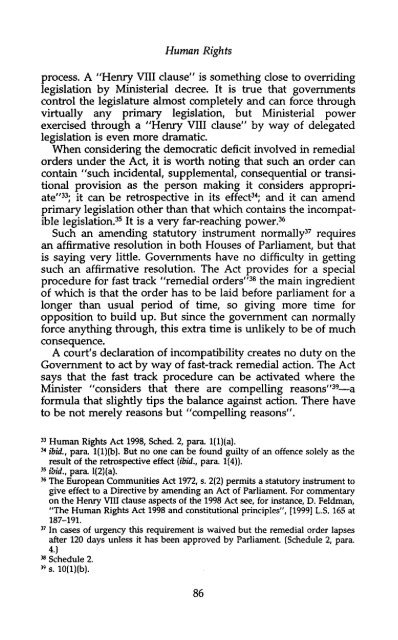HAMLYN - College of Social Sciences and International Studies ...
HAMLYN - College of Social Sciences and International Studies ...
HAMLYN - College of Social Sciences and International Studies ...
Create successful ePaper yourself
Turn your PDF publications into a flip-book with our unique Google optimized e-Paper software.
Human Rights<br />
process. A "Henry VIII clause" is something close to overriding<br />
legislation by Ministerial decree. It is true that governments<br />
control the legislature almost completely <strong>and</strong> can force through<br />
virtually any primary legislation, but Ministerial power<br />
exercised through a "Henry VIII clause" by way <strong>of</strong> delegated<br />
legislation is even more dramatic.<br />
When considering the democratic deficit involved in remedial<br />
orders under the Act, it is worth noting that such an order can<br />
contain "such incidental, supplemental, consequential or transitional<br />
provision as the person making it considers appropriate"<br />
33 ; it can be retrospective in its effect 34 ; <strong>and</strong> it can amend<br />
primary legislation other than that which contains the incompatible<br />
legislation. 35 It is a very far-reaching power. 36<br />
Such an amending statutory instrument normally 37 requires<br />
an affirmative resolution in both Houses <strong>of</strong> Parliament, but that<br />
is saying very little. Governments have no difficulty in getting<br />
such an affirmative resolution. The Act provides for a special<br />
procedure for fast track "remedial orders" 38 the main ingredient<br />
<strong>of</strong> which is that the order has to be laid before parliament for a<br />
longer than usual period <strong>of</strong> time, so giving more time for<br />
opposition to build up. But since the government can normally<br />
force anything through, this extra time is unlikely to be <strong>of</strong> much<br />
consequence.<br />
A court's declaration <strong>of</strong> incompatibility creates no duty on the<br />
Government to act by way <strong>of</strong> fast-track remedial action. The Act<br />
says that the fast track procedure can be activated where the<br />
Minister "considers that there are compelling reasons" 39 —a<br />
formula that slightly tips the balance against action. There have<br />
to be not merely reasons but "compelling reasons".<br />
33 Human Rights Act 1998, Sched. 2, para. l(l)(a).<br />
34 ibid., para. l(l)(b). But no one can be found guilty <strong>of</strong> an <strong>of</strong>fence solely as the<br />
result <strong>of</strong> the retrospective effect [ibid., para. 1(4)).<br />
35 ibid., para. l(2)(a).<br />
36 The European Communities Act 1972, s. 2(2) permits a statutory instrument to<br />
give effect to a Directive by amending an Act <strong>of</strong> Parliament. For commentary<br />
on the Henry VIII clause aspects <strong>of</strong> the 1998 Act see, for instance, D. Feldman,<br />
"The Human Rights Act 1998 <strong>and</strong> constitutional principles", [1999] L.S. 165 at<br />
187-191.<br />
37 In cases <strong>of</strong> urgency this requirement is waived but the remedial order lapses<br />
after 120 days unless it has been approved by Parliament. (Schedule 2, para.<br />
4.)<br />
38 Schedule 2.<br />
39 s. 10(l)(b).<br />
86

















